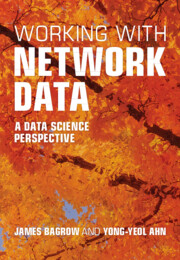Book contents
- Frontmatter
- Contents
- Preface
- Part I Background
- Part II Applications, tools, and tasks
- Interlude — Good practices for scientific computing
- Part III Fundamentals
- Chapter 21 Networks demand network thinking: the friendship paradox
- Chapter 22 Network models
- Chapter 23 Statistical models and inference
- Chapter 24 Uncertainty quantification and error analysis
- Chapter 25 Ghost in the matrix: spectral methods for networks
- Chapter 26 Embedding and machine learning
- Chapter 27 Big data and scalability
- Conclusion
- Bibliography
- Index
Chapter 21 - Networks demand network thinking: the friendship paradox
from Part III - Fundamentals
Published online by Cambridge University Press: 06 June 2024
- Frontmatter
- Contents
- Preface
- Part I Background
- Part II Applications, tools, and tasks
- Interlude — Good practices for scientific computing
- Part III Fundamentals
- Chapter 21 Networks demand network thinking: the friendship paradox
- Chapter 22 Network models
- Chapter 23 Statistical models and inference
- Chapter 24 Uncertainty quantification and error analysis
- Chapter 25 Ghost in the matrix: spectral methods for networks
- Chapter 26 Embedding and machine learning
- Chapter 27 Big data and scalability
- Conclusion
- Bibliography
- Index
Summary
In this chapter, we begin our dive into the fundamentals of network data. We delve deep into the strange world of networks by considering the friendship paradox, the apparently contradictory finding that most people (nodes) have friends (neighbors) who are more popular than themselves. How can this be? Where are all these friends coming from? We introduce network thinking to resolve this paradox. As we will see, It is due to constraints induced by the network structure: pick a node randomly and you are much more likely to land next to a high-degree node than on a high-degree node because high-degree nodes have many neighbors. This is unexpected, almost profoundly so; a local (node-level) view of a network will not accurately reflect the global network structure. This paradox highlights the care we need to take when thinking about networks and network data mathematically and practically.
Keywords
- Type
- Chapter
- Information
- Working with Network DataA Data Science Perspective, pp. 317 - 326Publisher: Cambridge University PressPrint publication year: 2024

